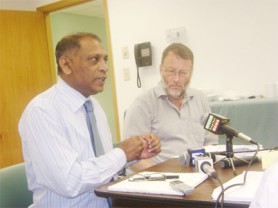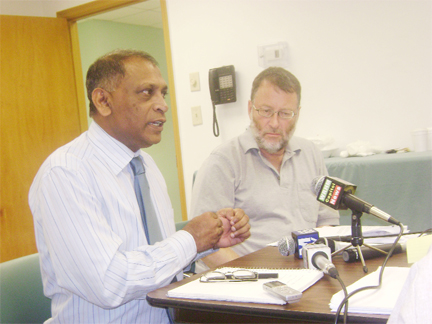Minster of Health Dr Leslie Ramsammy said a multi-sectoral response is needed to curb suicide as he launched a new follow back study that is intended to offer researchers a “post-mortem of a person’s life” as the ministry ups efforts to curb the phenomenon.

Last Sunday, in his address at the Project Dawn building at Liliendaal, Ramsammy said the study will help health officers “to understand the footprints – the special characteristics to look for in a person who will attempt or commits suicide successfully.”
Ten health workers are currently undergoing training to determine the factors which contribute to suicide and possible means of intervention. Ramsammy said, “Understanding will help us to create a programme which will help to prevent suicide.” On completion of training, the workers are expected to venture into communities to train other ‘gatekeepers’ to prevent suicide. Gatekeepers can be family, friends, community or church leaders or the closest person to someone who is contemplating suicide. “While suicide is a major health problem in Guyana, it is not only a Guyanese problem, it is a global public health problem,” Dr Ramsammy said, adding that over the last five years the ministry has been trying to streamline projects that would serve as a public health response to the problem.
In addition to the study, the minister said other factors such as alcohol abuse and adverse medical diagnoses that have led to suicide having to be addressed. Mental illnesses such as schizophrenia, bipolar disorder, and depression will also have to be examined, he said.
The minister said that he was unsure about the number of suicide attempts as they often go unreported due to the fear of stigma and discrimination. He emphasised that persons who attempt and commit suicide have severe problems and should be offered help to cope with them instead of being subject to discrimination.
Ramsammy noted that about 800 attempts have been recorded every year. He also reiterated that all public and private health care providers are obligated to provide the ministry with all data related to suicides or attempted suicides within 24 hours of the act. “The ministry is ready to launch a comprehensive suicide prevention programme in Guyana, one not likely to be found in any other developing country,” he said.
He also disclosed that a substance abuse rehabilitation programme was launched in Georgetown and Region Six. He said substance abuse may be the biggest contributing factor to suicide in Region Six.
Work is also being done in the areas of prevention and intervention. A crisis hotline will officially be launched in September, at a centre housed at the ministry. The minister said every call will be recorded and studied and responses will be monitored to assess the training needs of operators. In the initial stages, the hotline will be a 12-hour service then later a 24-hour service.
The ministry is also working closely with the pesticide board as 60% to 70% of all suicides involve the ingestion of pesticides. Ramsammy said the aim is to structure a system that restricts persons’ access to chemicals. The ministry is also collaborating with the manufacturers of Gramoxone about the proper and safe storage of the chemical. An antidote for the poison is being sought which would be given to hospitals to help reduce deaths.
Meanwhile, Canadian consultant on suicide prevention Jack Hicks said that while it seems that more men commit suicide, more women attempt the act. Hicks said there is no clear-cut methodology for an at-risk group since it differs across countries and age groups, and the basis of the study is to understand why some end in tragedy and some do not. He also lauded the ministry’s initiative and posited that it may be the first study in South America.

